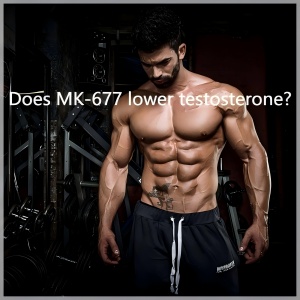Does MK-677 lower testosterone?

MK-677, also known as Ibutamoren, is a growth hormone secretagogue often used for its muscle-building and recovery benefits. One of the common concerns among users is whether MK-677 has a negative effect on testosterone levels. While it does influence hormone activity, especially growth hormone and IGF-1, its impact on testosterone is not as direct as some might think. Understanding how MK-677 works and interacts with the endocrine system can help clear up confusion about its relationship with testosterone.
How MK-677 Works in the Body
MK-677 mimics the hormone ghrelin and stimulates the pituitary gland to release more growth hormone. This leads to a rise in IGF-1 levels, which supports muscle growth, fat loss, and tissue repair. Unlike anabolic steroids or testosterone replacement therapy, MK-677 does not directly increase or suppress testosterone production. Its primary mechanism is centered on growth hormone regulation, not the androgen system.
Does MK-677 Suppress Natural Testosterone?
Based on available research and anecdotal reports, MK-677 does not appear to lower natural testosterone levels. Since it doesn't affect the hypothalamic-pituitary-gonadal (HPG) axis, it doesn't interfere with how your body produces testosterone. This makes it different from steroids, which can shut down testosterone production. Most users don’t experience any drop in testosterone while using MK-677, even during extended cycles.
Can MK-677 Increase Testosterone Indirectly?
While MK-677 doesn’t raise testosterone directly, some users report feeling more energized, stronger, and sexually active during use. These effects are likely due to better sleep quality, improved recovery, and increased IGF-1, rather than a rise in testosterone itself. There’s no strong evidence showing MK-677 can boost testosterone, but it may enhance the effects of testosterone already in your system by improving other aspects of your hormonal health.
MK-677 vs. Steroids: Key Differences
It’s important to distinguish MK-677 from anabolic steroids. Steroids introduce synthetic testosterone into the body, which often causes natural testosterone production to decrease due to negative feedback loops. MK-677 does not supply any external hormones; it simply encourages the body to release more of its own growth hormone. That’s why it's not associated with testosterone suppression or the need for post-cycle therapy (PCT) in most cases.
Who Should Be Cautious When Using MK-677?
Even though MK-677 is generally considered safe in terms of testosterone impact, people with existing hormonal imbalances or endocrine issues should still proceed with caution. It’s always a good idea to get bloodwork done before and after a cycle to monitor any changes. If you're stacking MK-677 with other compounds, the overall hormonal effects might be different, so it’s important to evaluate the entire protocol, not just MK-677 in isolation.
Summary of Current Research
Clinical studies involving MK-677, particularly in older adults, have not shown any significant suppression of testosterone. In fact, some participants maintained stable testosterone levels while experiencing improved lean body mass and better sleep. This supports the idea that MK-677 works independently of testosterone and does not negatively interfere with its production.
